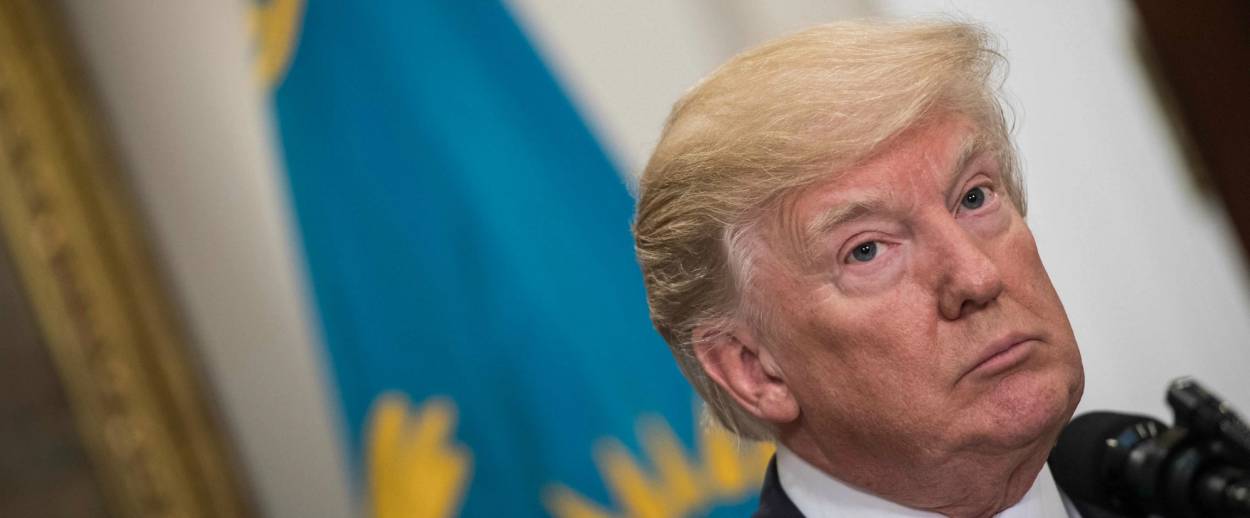King Ubu, Trump’s Dadaist Precursor
Alfred Jarry’s character is the president’s true predecessor, right down to the bad words




He has insulted women.
Piled lie on slanderous lie.
Dismissed those who have called him to account for the worrisome rise in racist and anti-Semitic incidents in the United States.
He has spouted nonsense about the climate.
Claimed to have sold aircraft to Norway that exist only in a video game.
He may have had illegal contact with agents of a hostile power.
But with his most recent utterances, following on his unhinged responses to Michael Wolff’s account of the first year of his presidency, Donald Trump has crossed a new threshold of infamy and, it must be said, of grotesqueness.
* * *
His outburst about the “shithole countries” that he deems Haiti, El Salvador, and various parts of Africa to be, countries from which the United States should, in his view, immediately cease welcoming immigrants, reminded the French—as well as theater fanatics around the world—of a figure who existed only on the stage for a century.
To a French ear, Trump’s term evokes the first utterance of the central character in the play, Ubu Roi, that, in 1896, set the standard for the grotesque in politics.
That utterance was a thunderous “Shit!”—the opening salvo from the famous Père Ubu, who had been dreamed up in 1888 by a 15-year-old secondary-school student from Brittany. Alfred Jarry grew into a genius of burlesque and a destroyer of idols; he was an inspiration for the symbolists, surrealists, and Dadaists who followed.
Trump’s trash talk reminds us of Ubu’s “bougre de merdre” (shitty bugger) and its nonsensical variants, which litter the speech of the carnival king—egotistical, cowardly, greedy, and ignorant—whose “comic abomination” Jarry believed would be the hallmark of future authority.
And as for his second outburst of the week, the one in which the American president informed his fellow citizens that, contrary to what the hostile purveyors of fake news would have them believe, he was neither a moron nor a dimwitted child but rather a “very stable genius,” it is impossible for a theater lover not to think of the Trumpism that Ubu delivers a few lines later, after his wife, a Lady Macbeth wannabe, has pricked her husband’s envy and vanity by asking him if he is content with his lot: “By my green candle—shit, madame!—I certainly am content!” How well Trump’s self-assessment echoes the self-satisfaction of Jarry’s “captain of the dragoons, trusted officer of King Wenceslas, member of the Order of the Red Eagle of Poland, and former king of Aragon,” who has amused and thrilled generations of surrealists.
Ubu, it appears, is Trump—but, this time, he is real.
The same Ubu—irascible, scatological, conspiracy-minded, and tyrannical—that Alfred Jarry invented but whom no one had to take seriously because he was confined to the stage has come to life as Donald Trump.
And the precursor of Dadaism, the “sure and sober dramatic sculptor” lauded by Mallarmé, the pranking student who began by lampooning his physics teacher and saw his joke become first a work of art and then a myth, who got so caught up in his character that he put Ubu’s name to some of his subsequent works, now, a century later, has had his grimmest intuitions confirmed by the man with the yellow pompadour and the too-long tie.
* * *
Roman emperors left sayings for future millennia (“veni, vidi, vici”).
French kings coined paradoxical or provocative maxims (“L’Etat, c’est moi”).
American presidents, the best and worst of them, saved their puerile jokes and private rages for biographers (e.g., Clinton, in Bob Woodward’s book) while striving to speak to the world in a dignified way.
Trump spouts vulgarities.
He studs his speech now not just with wasted words but words of waste.
And those who must watch this display, the witnesses (not to mention the victims!) of this barrage of invective, violence, and pus, are reduced to wading knee-deep in his nauseating mess.
Transgression, at this point, is no longer an accident or exception: It has become policy.
It is no longer the language of the people jauntily deployed against political doublespeak. It is a new kind of language whose inevitable effect, as Jarry accurately predicted, must be the erosion of sociability, the breaking of social bonds, and the transformation of politics into banditry.
It is no longer buffoonery or farce; it is the sound of the social contract, that of Hobbes no less than that of Rousseau, dissolving in the acid of a social discourse gone mad.
The twentieth century saw many blustering potentates who still managed to contain themselves.
It witnessed no shortage of demagogues, but they seemed receptive to the recommendation of a French head of government from the 1920s who had read Jarry: “Politics is like blood sausage; it should smell like shit, but not overly.”
But now, in a roar of tweets and expletives hurled at a stupefied planet, speech is unleashed by one of those who were supposed to be its guardians.
That the country on which, because of its embodiment of democratic values, the equilibrium of the planet has so long depended should now be at the forefront of a sinister global trend is a dire omen.
That its leader personifies to such an extreme the paradigm of transgressive violence that sleeps within all power, a paradigm diagnosed a century ago by a prophetic student and that now is running riot, chills the spine.
“Hurrah! Stick it to them! Long live Père Ubu!” Is that how it will be?
No, please, no.
Translated from the French by Steven B. Kennedy.
Bernard-Henri Lévy is a philosopher, activist, filmmaker, and author of more than 30 books including The Genius of Judaism, American Vertigo, Barbarism with a Human Face, Who Killed Daniel Pearl?, and The Empire and the Five Kings. His most recent film, Slava Ukraini, premiered nationwide on May 5, 2023.